- Home
- Lewis Carroll
Jabberwocky and Other Nonsense Page 10
Jabberwocky and Other Nonsense Read online
Page 10
My Simon! My Simon! Oh, charming man! Oh, charming man!
Dear Simon Smith, sweet Simon Smith.
Oh, there goes the church-clock, the town-clock, the station-clock and there go the other clocks, they are all striking twelve!
[30] Oh, Simon, it is getting late, it’s very dull to sit and wait.
And really I’m in such a state, I hope you’ll come at any rate, quite early in the morning, quite early in the morning.
Then with prancing bays & yellow chaise, we’ll away to Gretna Green.
For when I am with my Simon Smith – oh, that common name! Oh that vulgar name!
I shall never rest happy till he’s changed that name, but when he has married me, maybe he’ll love me to that degree, that he’ll grant me my prayer
And will call himself ‘Clare’ –”
So she talked all alone, as she sat upon a stone,
Still hoping he would come and find her, and she started most unkimmon, when instead of darling “Simmon” ’twas a strange man that stood behind her,
Who civilly observed “Good evening, M’am,
I really am surprised to see that you’re out here alone, for you must own from thieves you’re not secure.
[40] A watch, I see. Pray lend it me (I hope the gold is pure).
And all those rings, & other things – Don’t scream, you know, for long ago
The policeman off from his beat has gone.
In the kitchen –” “Oh, you desperate villain! Oh, you treacherous thief!”
And these were the words of her anger and grief.
“When first to Simon Smith I gave my hand I never could have thought he would have acted half so mean as this,
And where’s the new police? Oh, Simon, Simon! how could you treat your love so ill?”
They sit & chatter, they chatter with the cook, the guardians, so they’re called, of public peace.
Through the tanyard was heard the dismal sound, “How on earth is it policemen never, never, never, can be found?”
Alice’s Adventures in Wonderland (1865)
[“All in the golden afternoon”]
All in the golden afternoon
Full leisurely we glide;
For both our oars, with little skill,
By little arms are plied,
While little hands make vain pretence
Our wanderings to guide.
Ah, cruel Three! In such an hour,
Beneath such dreamy weather,
To beg a tale of breath too weak
[10] To stir the tiniest feather!
Yet what can one poor voice avail
Against three tongues together?
Imperious Prima flashes forth
Her edict “to begin it”:
In gentler tones Secunda hopes
“There will be nonsense in it!”
While Tertia interrupts the tale
Not more than once a minute.
Anon, to sudden silence won,
[20] In fancy they pursue
The dream-child moving through a land
Of wonders wild and new,
In friendly chat with bird and beast –
And half believe it true.
And ever, as the story drained
The wells of fancy dry,
And faintly strove that weary one
To put the subject by,
“The rest next time –” “It is next time!”
[30] The happy voices cry.
Thus grew the tale of Wonderland:
Thus slowly, one by one,
Its quaint events were hammered out –
And now the tale is done,
And home we steer, a merry crew,
Beneath the setting sun.
Alice! A childish story take,
And, with a gentle hand,
Lay it where Childhood’s dreams are twined
[40] In Memory’s mystic band,
Like pilgrim’s wither’d wreath of flowers
Pluck’d in a far-off land.
[“How doth the little crocodile”]
How doth the little crocodile
Improve his shining tail,
And pour the waters of the Nile
On every golden scale!
How cheerfully he seems to grin,
How neatly spreads his claws,
And welcomes little fishes in,
With gently smiling jaws!
[Mouse Tails]
[“We lived beneath the mat”]
[“Fury said to”]
[“ ‘You are old, Father William,’the young man said”]
“You are old, Father William,” the young man said,
“And your hair has become very white;
And yet you incessantly stand on your head –
Do you think, at your age, it is right?”
“In my youth,” Father William replied to his son,
“I feared it might injure the brain;
But, now that I’m perfectly sure I have none,
Why, I do it again and again.”
“You are old,” said the youth, “as I mentioned before,
[10] And have grown most uncommonly fat;
Yet you turned a back-somersault in at the door –
Pray, what is the reason for that?”
“In my youth,” said the sage, as he shook his grey locks,
“I kept all my limbs very supple
By the use of this ointment – one shilling the box –
Allow me to sell you a couple?”
“You are old,” said the youth, “and your jaws are too weak
For anything tougher than suet;
Yet you finished the goose, with the bones and the beak –
[20] Pray, how did you manage to do it?”
“In my youth,” said his father, “I took to the law,
And argued each case with my wife;
And the muscular strength, which it gave to my jaw
Has lasted the rest of my life.”
“You are old,” said the youth, “one would hardly suppose
That your eye was as steady as ever;
Yet you balanced an eel on the end of your nose –
What made you so awfully clever?”
“I have answered three questions, and that is enough,”
[30] Said his father. “Don’t give yourself airs!
Do you think I can listen all day to such stuff?
Be off, or I’ll kick you down-stairs!”
[The Duchess’s Lullaby]
“Speak roughly to your little boy,
And beat him when he sneezes:
He only does it to annoy,
Because he knows it teases.”
CHORUS
(in which the cook and the baby joined): –
“Wow! wow! wow!”
“I speak severely to my boy,
I beat him when he sneezes;
For he can thoroughly enjoy
The pepper when it pleases!”
CHORUS
“Wow! wow! wow!”
[“Twinkle, twinkle, little bat”]
Twinkle, twinkle, little bat!
How I wonder what you’re at!
Up above the world you fly,
Like a tea-tray in the sky.
Twinkle, twinkle———
[The Mock Turtle’s Song: I]
“Will you walk a little faster?” said a whiting to a snail,
“There’s a porpoise close behind us, and he’s treading on my tail.
See how eagerly the lobsters and the turtles all advance!
They are waiting on the shingle – will you come and join the dance?
Will you, won’t you, will you, won’t you, will you join the dance?
Will you, won’t you, will you, won’t you, won’t you join the dance?
“You can really have no notion how delightful it will be
When they take us up and throw us, with the lobsters, out to sea!”
But the snail replied “To
o far, too far!”, and gave a look askance –
[10] Said he thanked the whiting kindly, but he would not join the dance.
Would not, could not, would not, could not, would not join the dance.
Would not, could not, would not, could not, could not join the dance.
“What matters it how far we go?” his scaly friend replied.
“There is another shore, you know, upon the other side.
The further off from England the nearer is to France –
Then turn not pale, beloved snail, but come and join the dance.
Will you, won’t you, will you, won’t you, will you join the dance?
Will you, won’t you, will you, won’t you, won’t you join the dance?”
[The Mock Turtle’s Song in “Alice’s Adventures Under Ground”]
Beneath the waters of the sea,
Are lobsters thick as thick can be –
They love to dance with you and me,
My own, my gentle Salmon!
Chorus:
Salmon come up! Salmon go down!
Salmon come twist your tail around!
Of all the fishes of the sea
There’s none so good as salmon!
[“ ’Tis the voice of the Lobster: I heard him declare”]
’Tis the voice of the Lobster: I heard him declare
“You have baked me too brown, I must sugar my hair.”
As a duck with his eyelids, so he with his nose
Trims his belt and his buttons, and turns out his toes.
When the sands are all dry, he is gay as a lark,
And will talk in contemptuous tones of the Shark:
But, when the tide rises and sharks are around,
His voice has a timid and tremulous sound.
[1886 completion of “ ’Tis the voice of the Lobster”]
I passed by his garden, and marked, with one eye,
How the Owl and the Panther were sharing a pie:
The panther took pie crust, and gravy, and meat,
While the Owl had the dish as its share of the treat.
When the pie was all finished, the Owl, as a boon,
Was kindly permitted to pocket the spoon:
While the Panther received knife and fork with a growl,
And concluded the banquet by———
[The Mock Turtle’s Song: II]
“Beautiful soup, so rich and green,
Waiting in a hot tureen!
Who for such dainties would not stoop?
Soup of the evening, beautiful Soup!
Soup of the evening, beautiful Soup!
Beau———ootiful Soo———oop!
Beau———ootiful Soo———oop!
Soo———oop of the e———e———evening,
Beautiful, beautiful Soup!
[10] “Beautiful Soup! Who cares for fish,
Game, or any other dish?
Who would not give all else for two p
ennyworth only of beautiful Soup?
Pennyworth only of beautiful Soup?
Beau———ootiful Soo———oop!
Beau———ootiful Soo———oop!
Soo———oop of the e———e———evening,
Beautiful, beauti———FUL SOUP!”
(“Soo———oop of the e———e———evening,
[20] Beautiful, beautiful Soup!”)
[The White Rabbit’s Evidence]
They told me you had been to her,
And mentioned me to him:
She gave me a good character,
But said I could not swim.
He sent them word I had not gone
(We know it to be true):
If she should push the matter on,
What would become of you?
I gave her one, they gave him two,
[10] You gave us three or more;
They all returned from him to you,
Though they were mine before.
If I or she should chance to be
Involved in this affair,
He trusts to you to set them free,
Exactly as we were.
My notion was that you had been
(Before she had this fit)
An obstacle that came between
[20] Him, and ourselves, and it.
Don’t let him know she liked them best,
For this must ever be
A secret, kept from all the rest,
Between yourself and me.
Phantasmagoria and Other Poems (1869)
[Part 1]
Phantasmagoria
Canto I – The Trystyng
One winter night, at half-past nine,
Cold, tired, and cross, and muddy,
I had come home, too late to dine,
And supper, with cigars and wine,
Was waiting in the study.
There was a strangeness in the room,
And something white and wavy
Was standing near me in the gloom –
I took it for the carpet-broom
[10] Left by that careless slavey.
But presently the thing began
To shudder and to sneeze:
On which I said “Come, come, my man,
That’s a most inconsiderate plan –
Less noise there, if you please!”
“I’ve caught a cold,” the thing replies,
“Out there upon the landing –”
I turned to look in some surprise,
And there, before my very eyes,
[20] A little Ghost was standing!
He trembled when he caught my eye,
And got behind a chair:
“How came you here,” I said, “and why?
I never saw a thing so shy.
Come out! Don’t shiver there!”
He said “I’d gladly tell you how,
And also tell you why,
But” (here he gave a little bow)
“You’re in so bad a temper now,
[30] You’d think it all a lie.
“And as to being in a fright,
Allow me to remark
That ghosts have just as good a right
In every way, to fear the light,
As men to fear the dark.”
“No plea,” said I, “can well excuse
Such cowardice in you:
For ghosts can visit when they choose,
Whereas we humans can’t refuse
[40] To grant the interview.”
He said “A flutter of alarm
Is not unnatural, is it?
I really feared you meant some harm,
But, now I see that you are calm,
Let me explain my visit.
“That last ghost left you on the third –
Since then you’ve not been haunted:
But, as he never sent us word,
’Twas quite by accident we heard
[50] That any one was wanted.
“A Spectre has first choice, by right,
In filling up a vacancy;
Then Phantom, Goblin, Elf, and Sprite –
If all these fail them, they invite
The nicest Ghoul that they can see.
“The Spectres said the place was low,
And that you kept bad wine:
So, as a Phantom had to go,
And I was first, of course, you know,
[60] I couldn’t well decline.”
“No doubt,” said I, “they settled who
Was fittest to be sent:
Yet still to choose a brat like you,
To haunt a man of forty-two,
Was no great compliment.”
“I’m not so young, Sir,” he replied,
“As you might think – the fact is,
In caverns by the water side,
And other places that I’ve tried,
[70] I’ve had a lot of practice:
“But I have never taken yet
A strict domestic part,
&
nbsp; And in my flurry I forget
The Five Good Rules of Etiquette
We have to know by heart.”
My sympathies were warming fast
Towards the little fellow;
He was so very much aghast
At having found a man at last,
[80] And looked so scared and yellow.
“At least,” I said, “I’m glad to find
A ghost is not a dumb thing –
But pray sit down – you’ll feel inclined
(If, like myself, you have not dined)
To take a snack of something:
“(Though, certainly, you don’t appear
A thing to offer food to);
And then I shall be glad to hear
(If you will say them loud and clear)
[90] The rules that you allude to.”
“Thanks! You shall hear them by and by –
This is a piece of luck!”
“What may I offer you?” said I.
“Well, since you are so kind, I’ll try
A little bit of duck.
“One slice! And may I ask you for
A little drop more gravy?”
I sat and looked at him in awe,
For certainly I never saw
[100] A thing so white and wavy.
And still he seemed to grow more white,
More vapoury, and wavier –
Seen in the dim and flickering light,
As he proceeded to recite
His “Maxims of Behaviour.”
Canto II – Hys Fyve Rules
“My First – but don’t suppose,” he said,
“I’m setting you a riddle –
Is – if your Victim be in bed,
Don’t touch the curtains at his head,
[110] But take it in the middle,
“And wave it slowly to and fro,
As if the wind was at it;
And in a minute’s time or so
He’ll be awake – and this you’ll know
By hearing him say ‘Drat it!’
“(And here you must on no pretence
Make the first observation:
Wait for the Victim to commence –
No ghost of any common sense
[120] Begins a conversation.)
“If he should say ‘How came you here?’
(The way that you began, Sir),

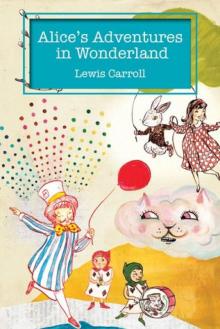 Alice's Adventures in Wonderland & Through the Looking-Glass
Alice's Adventures in Wonderland & Through the Looking-Glass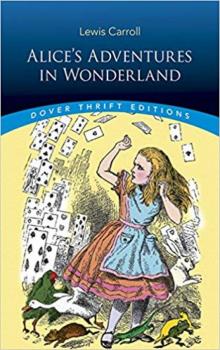 Alice's Adventures in Wonderland
Alice's Adventures in Wonderland O Frabjous Day!
O Frabjous Day!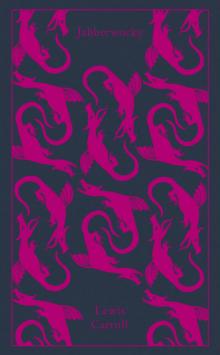 Jabberwocky and Other Nonsense
Jabberwocky and Other Nonsense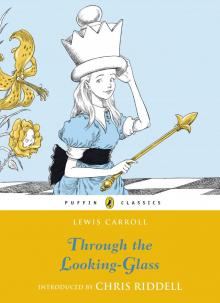 Through the Looking-Glass and What Alice Found There
Through the Looking-Glass and What Alice Found There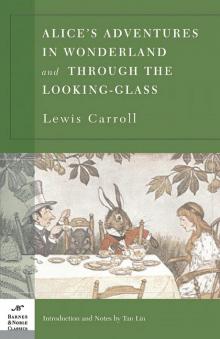 Alice's Adventures in Wonderland and Through the Looking Glass (B&N)
Alice's Adventures in Wonderland and Through the Looking Glass (B&N)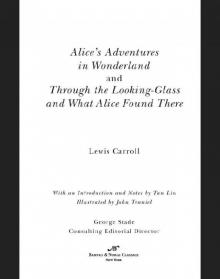 Alice's Adventures in Wonderland and Through the Looking Glass (Barnes & Noble Cla
Alice's Adventures in Wonderland and Through the Looking Glass (Barnes & Noble Cla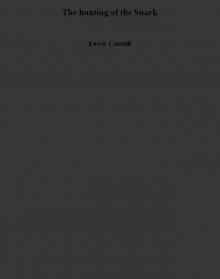 The hunting of the Snark
The hunting of the Snark The Complete Alice in Wonderland (Wonderland Imprints Master Editions)
The Complete Alice in Wonderland (Wonderland Imprints Master Editions) Alice in Wonderland: The Vampire Slayer
Alice in Wonderland: The Vampire Slayer Phantasmagoria and Other Poems
Phantasmagoria and Other Poems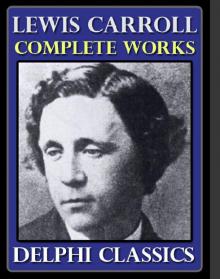 Complete Works of Lewis Carroll
Complete Works of Lewis Carroll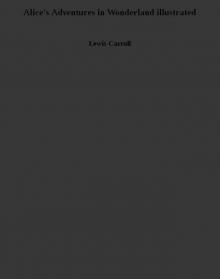 Alice's Adventures in Wonderland illustrated
Alice's Adventures in Wonderland illustrated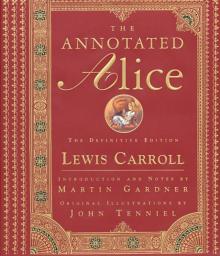 The Annotated Alice: The Definitive Edition (The Annotated Books)
The Annotated Alice: The Definitive Edition (The Annotated Books) Through the Looking Glass
Through the Looking Glass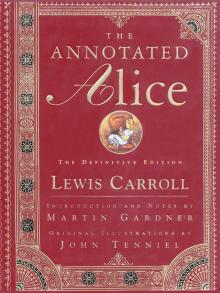 The Annotated Alice
The Annotated Alice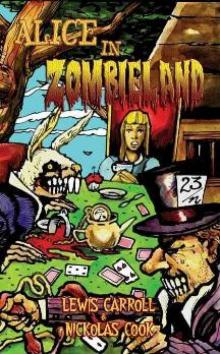 Alice in Zombieland
Alice in Zombieland